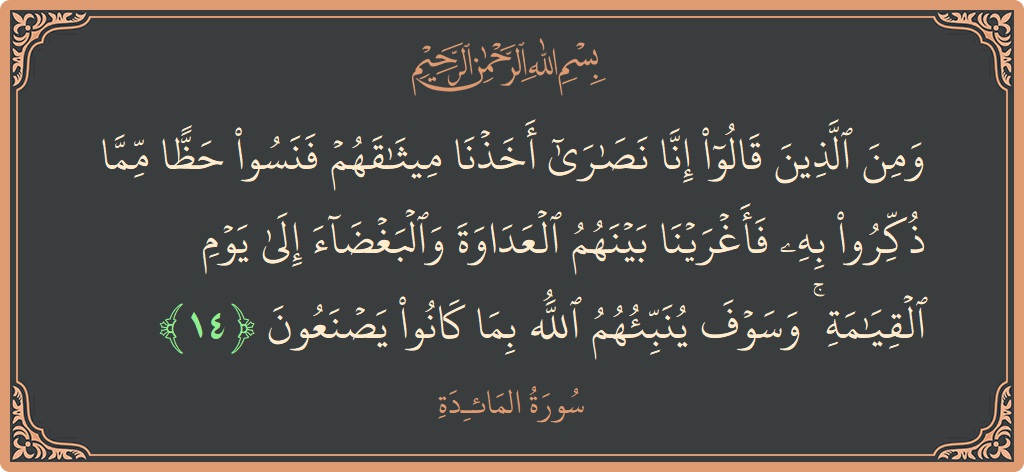Surah Al-Maaida: Verse 14 - ومن الذين قالوا إنا نصارى... - English
Tafsir of Verse 14, Surah Al-Maaida
English Translation
And from those who say, "We are Christians" We took their covenant; but they forgot a portion of that of which they were reminded. So We caused among them animosity and hatred until the Day of Resurrection. And Allah is going to inform them about what they used to do.English Transliteration
Wamina allatheena qaloo inna nasara akhathna meethaqahum fanasoo haththan mimma thukkiroo bihi faaghrayna baynahumu alAAadawata waalbaghdaa ila yawmi alqiyamati wasawfa yunabbiohumu Allahu bima kanoo yasnaAAoonaTafsir of Verse 14
From the first verse, 5:13, which dealt with the breach of trust by Jews and their punishment for it, we now move to the next verse, 5:14, which refers to Christians: وَمِنَ الَّذِينَ قَالُوا إِنَّا نَصَارَىٰ. In this verse, the punishment described for Christians is mutual dissension. Being for their breach of trust, this wi11 continue right upto the Last Day.
Looking at the contemporary scene, one may have doubts about Christians who seem to be united. The answer is that the present statement covers genuine Christians, observing and abiding. As for those who have moved away from their own religion turning into non-conformist, secular or atheistic individuals or groups, they are, for all practical purposes, out of the list of Christians - even though, they may count them as Christians among the nationalities of a country. If, among such people, that religious dissension and mutual hostility does not exist, it would not be contrary to this verse - because the conflict was based on religion, once the religion is not there, conflict too would not be there. As said earlier, this verse describes people who profess and practice the religion of Christianity - and their division is well-known.
Given below is a brief reference from Taysir in the marginal notes of commentator, al-Baydawi which reports that there were three sects among Christians originally:
1. Fisturyah (Nestorians) who took Sayyidna ` Isa (علیہ السلام) (Jesus) as the son of God.
2. Ya'qubiyah (Jacobites) who believed in Sayyidna ` Isa (علیہ السلام) (Jesus) himself as one with God.
3. Malka'iyah (Malkites) who believed in Sayyidna ` Isa (علیہ السلام) (Jesus) as one of the Trinity.
And it goes without saying that in the presence of such major divisions in matters of belief, mutual malice is inevitable.
